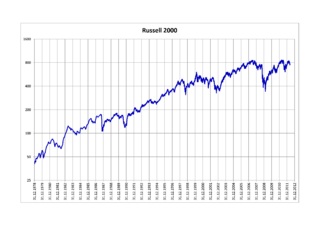Related Research Articles
Passive management is an investing strategy that tracks a market-weighted index or portfolio. Passive management is most common on the equity market, where index funds track a stock market index, but it is becoming more common in other investment types, including bonds, commodities and hedge funds.
An index fund is a mutual fund or exchange-traded fund (ETF) designed to follow certain preset rules so that the fund can track a specified basket of underlying investments. While index providers often emphasize that they are for-profit organizations, index providers have the ability to act as "reluctant regulators" when determining which companies are suitable for an index. Those rules may include tracking prominent indexes like the S&P 500 or the Dow Jones Industrial Average or implementation rules, such as tax-management, tracking error minimization, large block trading or patient/flexible trading strategies that allow for greater tracking error but lower market impact costs. Index funds may also have rules that screen for social and sustainable criteria.
A mutual fund is an open-end professionally managed investment fund that pools money from many investors to purchase securities. Mutual funds are "the largest proportion of equity of U.S. corporations." Mutual fund investors may be retail or institutional in nature. The term is typically used in the United States, Canada, and India, while similar structures across the globe include the SICAV in Europe and open-ended investment company (OEIC) in the UK.
An exchange-traded fund (ETF) is a type of investment fund and exchange-traded product, i.e. they are traded on stock exchanges. ETFs are similar in many ways to mutual funds, except that ETFs are bought and sold throughout the day on stock exchanges while mutual funds are bought and sold based on their price at day's end. An ETF holds assets such as stocks, bonds, currencies, and/or commodities such as gold bars, and generally operates with an arbitrage mechanism designed to keep it trading close to its net asset value, although deviations can occasionally occur. Most ETFs are index funds: that is, they hold the same securities in the same proportions as a certain stock market index or bond market index. The most popular ETFs in the U.S. replicate the S&P 500 Index, the total market index, the NASDAQ-100 index, the price of gold, the "growth" stocks in the Russell 1000 Index, or the index of the largest technology companies. With the exception of non-transparent actively managed ETFs, in most cases, the list of stocks that each ETF owns, as well as their weightings, is posted daily on the website of the issuer. The largest ETFs have annual fees of 0.03% of the amount invested, or even lower, although specialty ETFs can have annual fees well in excess of 1% of the amount invested. These fees are paid to the ETF issuer out of dividends received from the underlying holdings or from selling assets.

The Russell 2000 Index is a small-cap stock market index of the smallest 2,000 stocks in the Russell 3000 Index. It was started by the Frank Russell Company in 1984. The index is maintained by FTSE Russell, a subsidiary of the London Stock Exchange Group.
Russell indexes are a family of global stock market indices from FTSE Russell that allow investors to track the performance of distinct market segments worldwide. Many investors use mutual funds or exchange-traded funds based on the FTSE Russell Indexes as a way of gaining exposure to certain portions of the U.S. stock market. Additionally, many investment managers use the Russell Indexes as benchmarks to measure their own performance. Russell's index design has led to more assets benchmarked to its U.S. index family than all other U.S. equity indexes combined.
Investment management is the professional asset management of various securities, including shareholdings, bonds, and other assets, such as real estate, in order to meet specified investment goals for the benefit of investors. Investors may be institutions, such as insurance companies, pension funds, corporations, charities, educational establishments, or private investors, either directly via investment contracts or, more commonly, via collective investment schemes like mutual funds, exchange-traded funds, or REITs.
Active management refers to a portfolio management strategy where the manager makes specific investments with the goal of outperforming an investment benchmark index or target return. In passive management, investors expect a return that closely replicates the investment weighting and returns of a benchmark index and will often invest in an index fund.
Style investing is an investment approach in which rotation among different "styles" is supposed to be important for successful investing. As opposed to investing in individual securities, style investors can decide to make portfolio allocation decisions by placing their money in broad categories of assets, such as "large-cap", "growth", "international", or "emerging markets".
Dynamic asset allocation is a strategy used by investment products such as hedge funds, mutual funds, credit derivatives, index funds, principal protected notes and other structured investment products to achieve exposure to various investment opportunities and provide 100% principal protection.

Socially responsible investing (SRI), social investment, sustainable socially conscious, "green" or ethical investing, is any investment strategy which seeks to consider both financial return and social/environmental good to bring about social change regarded as positive by proponents. Socially responsible investments often constitute a small percentage of total funds invested by corporations and are riddled with obstacles.
Thomson Reuters Lipper is an American financial services firm. Founded in 1973 as Lipper Analytical Services, it was acquired by Reuters in 1998.

A bond index or bond market index is a method of measuring the investment performance and characteristics of the bond market. There are numerous indices of differing construction that are designed to measure the aggregate bond market and its various sectors A bond index is computed from the change in market prices and, in the case of a total return index, the interest payments, associated with selected bonds over a specified period of time. Bond indices are used by investors and portfolio managers as a benchmark against which to measure the performance of actively managed bond portfolios, which attempt to outperform the index, and passively managed bond portfolios, that are designed to match the performance of the index. Bond indices are also used in determining the compensation of those who manage bond portfolios on a performance-fee basis.
The S&P/ASX 300, or simply, ASX 300, is a stock market index of Australian stocks listed on the Australian Securities Exchange (ASX). The index is market-capitalisation weighted, meaning each company included is in proportion to the indexes total market value, and float-adjusted, meaning the index only considers shares available to public investors.
S&P Dow Jones Indices LLC is a joint venture between S&P Global, the CME Group, and News Corp that was announced in 2011 and later launched in 2012. It produces, maintains, licenses, and markets stock market indices as benchmarks and as the basis of investable products, such as exchange-traded funds (ETFs), mutual funds, and structured products. The company currently has employees in 15 cities worldwide, including New York, London, Frankfurt, Singapore, Hong Kong, Sydney, Beijing, and Dubai.
The bias ratio is an indicator used in finance to analyze the returns of investment portfolios, and in performing due diligence.

In finance, a stock index, or stock market index, is an index that measures a stock market, or a subset of the stock market, that helps investors compare current price levels with past prices to calculate market performance. It is computed from the prices of selected stocks.
Refinitiv Indices is a line of indices and index services from Refinitiv:
Hedge fund replication is the collective name given to a number of different methods that attempt to replicate hedge fund returns. The hedge fund industry has boomed over recent years and various studies by investment banks as well as academic papers have shown that hedge funds may be nearing an alpha generating capacity constraint. This means hedge funds can no longer produce alpha in aggregate. Replication has been claimed to remove the illiquidity, transparency and fraud risk associated with direct investment in hedge funds. With the belief that the pursuit of alpha is a zero-sum game, more investors are looking to simply add "Hedge Fund Beta" to their portfolio. These early investors have been rewarded as the replicators outperformed their direct investment cousins in 2008 due to their greater liquidity and lower use of leverage.

An investment fund is a way of investing money alongside other investors in order to benefit from the inherent advantages of working as part of a group such as reducing the risks of the investment by a significant percentage. These advantages include an ability to: